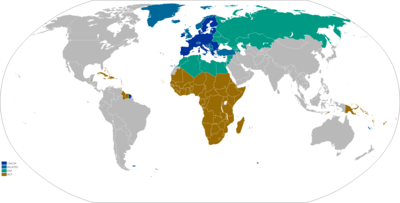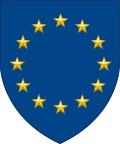Eurosphere
The Eurosphere or the European Empire[1] is a concept associated with the public intellectual Mark Leonard,[2] Oxford University academic Jan Zielonka,[1] the European Union Director-General for Politico-Military Affairs Robert Cooper[3] and the former European Commission President José Manuel Barroso.[4]

- Dark blue: European Union
- Light blue: Current enlargement agenda
- Turquoise: European Neighbourhood
- Brown: ACP countries
Background
Over the past 50 years, the European Union has expanded from 6 founding members to 27; additionally there are 8 candidate and potential candidate countries waiting to join. A number of European countries are integrated economically, as part of the European Single Market and using its single currency, the euro. Through its High Representative of the Union for Foreign Affairs and Security Policy, the EU has the capability to speak with one voice on the world stage and has established association and free trade agreements with many states. Furthermore, through the European Neighbourhood Policy and Union for the Mediterranean it is creating closer ties with countries on its borders; while developing ties with other former European colonies, the ACP countries.
Countries seeking membership in the EU must undergo a great deal of reform, for example the reforms seen in Turkey, such as the abolition of capital punishment.[5] The emergence of the Union's global influence, and the draw of membership, has been the subject of a number of academic writings. Mark Leonard describes the area of EU influence as the "Eurosphere".
Countries within the Eurosphere
According to Mark Leonard, the Eurosphere includes 109 countries. In Europe, this includes the 27 member states of the EU, applicant countries wishing to join the EU, the Western Balkans and European Commonwealth of Independent States countries (including Armenia, Belarus, Georgia, Moldova, Ukraine and transcontinental Kazakhstan). Curiously he does not mention Western European countries such as Norway who are already integrated into the EU's single market. Outside of Europe, he lists every African country and every Middle Eastern country, as well as the countries forming the eastern border of the Eurosphere such as Iran, Azerbaijan and Russia.[6]
Other countries that could be said to be within the Eurosphere include European countries belonging to the European Economic Area, such as Iceland or Liechtenstein, states using the euro as their currency, such as Andorra, Monaco and San Marino, or the EU's Outermost Regions (OMR) in the Caribbean, South America and in the Atlantic, such as French Guiana, Guadeloupe, La Réunion, Martinique and Saint Martin. In addition, the Overseas Countries and Territories (OCT) closely associated with the EU in the Atlantic, Caribbean, Pacific and Southern oceans are generally included in the Eurosphere such as Aruba, Bonaire, Curaçao, French Polynesia, Greenland and Saint-Pierre-et-Miquelon.
The above-mentioned groups all have strong economic and political links with the EU today.
Quotes
The postmodern, European answer to threats is to extend the system of co-operative empire ever wider. "I have no way to defend my borders but to extend them", said Catherine the Great—and the European Union sometimes seems to be saying the same.
— Robert Cooper, 2003
But the next wave of European transformation is only just beginning. The European Union is starting to develop an enormous sphere of influence, extending way beyond its borders, that could be called the "Eurosphere". This belt of eighty countries covering the former Soviet Union, the Western Balkans, the Middle East, North Africa, and Sub-Saharan Africa accounts for 20 per cent of the world's population.
— Mark Leonard, 2005
What we have is the first non-imperial empire...We have twenty-seven countries that fully decided to work together and to pool their sovereignty. I believe it is a great construction and we should be proud of it.
— José Manuel Barroso, 2007
See also
- Council of Europe
- Deep and Comprehensive Free Trade Area
- ECHO (European Commission)
- ACP-EU Development Cooperation
- ACP-EU Joint Parliamentary Assembly
- EU-ACP Economic Partnership Agreements
- ACP-EU Development Cooperation
- Enlargement of the European Union
- European Union Association Agreement
- European Economic Area
- Future Enlargement of the European Union
- European integration
- European Neighbourhood Policy
- Eastern Partnership
- Barcelona Process
- Euro-Mediterranean Parliamentary Assembly
- Mediterranean Union
- European Union as a potential superpower
- Eurovoc
- Foreign relations of the European Union
- Greater Europe
- Multi-speed Europe
- Pro-Europeanism
- Sphere of influence
- United States of Europe
- Southeast Europe Transport Community
Notes and references
- Zielonka, J. (2006), Europe as Empire, Oxford University Press: Oxford.
- Leonard, M. (2005), Why Europe will run the 21st century, Fourth Estate: London.
- Cooper, R. (2003), The Breaking of Nations, Atlantic Books: London.
- "The birth of new rome". Archived from the original on 12 June 2010.
- EU-Turkey relations Archived July 6, 2008, at the Wayback Machine euractiv.com
- Leonard, M. Why Europe will run the 21st century (2004, Fourth Estate). Appendix: p.145-146.
Further reading
- Ankerl, Guy (2000). Global communication without universal civilization. INU societal research. Vol.1: Coexisting contemporary civilizations : Arabo-Muslim, Bharati, Chinese, and Western. Geneva: INU Press. ISBN 2-88155-004-5.
External links
- "The EU as a Regional Normative Hegemon: The Case of European Neighbourhood Policy"
- Mahony, Honor (2007-07-11) Barroso says EU is an 'empire' EU Observer.
